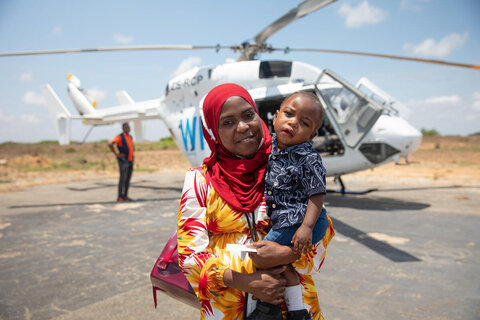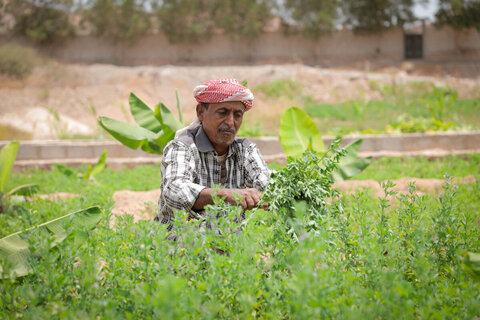The sound of silence
World Food Programme (WFP) Policy Programme Officer Judith Lumu opens up about being in the centre of an intricate humanitarian relief operation.

The connection is bad. A ringing phone greets me before Judy's voice cuts through the static and says hello. She's apologetic for having had to push our call back on such short notice.
"The team here shares an office," she starts as I strain to make out what she's saying. "Lately, it's been extra hard to find a quiet space to just talk."
Elusive, unless of course you're in the thick of it. This is Yemen, home to nearly 30 million people and the focus of an increasingly intricate humanitarian relief operation.
Her phone rings for the second time, and Judy whispers to a colleague that she's on a call with the emphasis placed on headquarters. I barely catch a few words through the crackling speakers but it's clear that she needs to be in three places at once, and more tellingly, she's used to it.
"And I thought I would be safe in the conference room," she tells me with a soft chuckle. "I'm so sorry."
When the fighting broke out in March of 2015, Yemen was already considered one of the world's poorest countries. The bitter conflict has sunk millions of Yemenis deeper into despair and destitution. Food by the UN World Food Programme (WFP) and humanitarian partners is all that has been preventing a massive outbreak of famine.
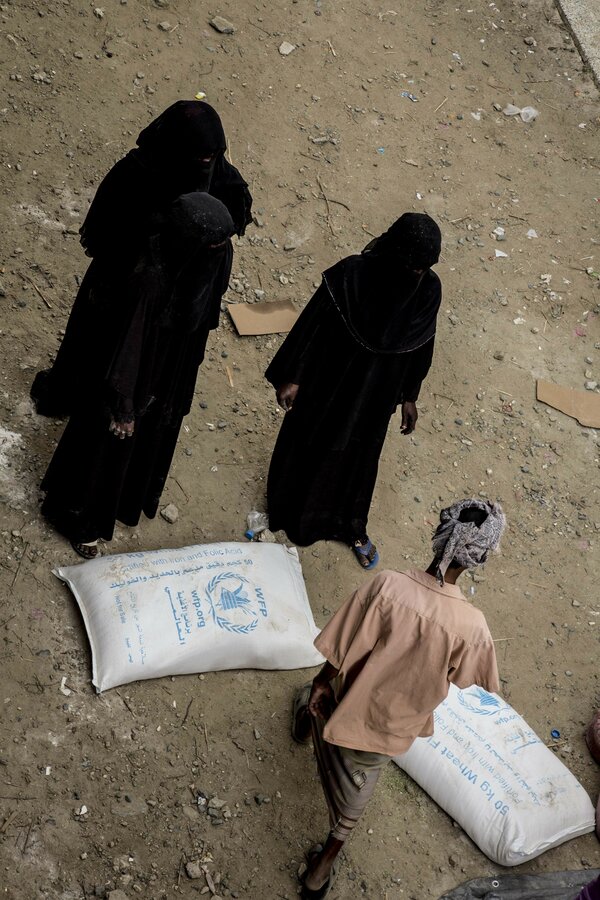
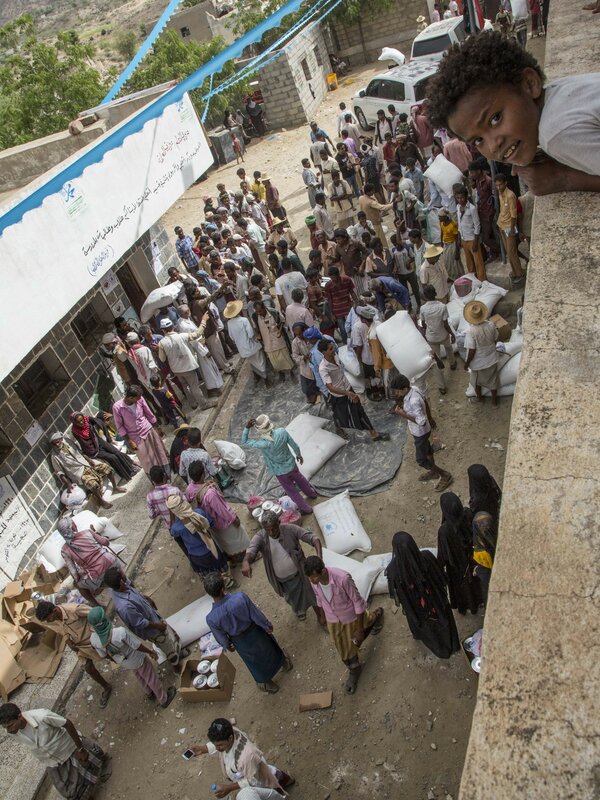
Back at the beginning of December, the international aid community had braced itself for the latest IPC numbers — a food security and nutrition assessment that drills data down across a country's regional and local levels. The results were expected to be bad, and they were.
But they also substantiated that the most severe levels of hunger were being faced by people in conflict zones — places where WFP and partners have not had consistent and safe access.
These same organizations are now working around the clock to identify and reach new caseloads of vulnerable people who urgently need food and nutrition support. Families that are malnourished, female-headed, or include disabled members top the priority list.
With a new plan to reach 12 million hungry people in 2019, the humanitarian aid world is in full-fledged, scale-up mode.
A ring, and this time it's for me. Judy seems to smile through the phone. "So, where were we?"
Judy is a mover and a shaker and a middleman; but most of all she's a doer.
As a Programme Policy Officer focused on general food assistance, she helps lay down plans to reach people with food but also guides WFP partners on how to enact those plans. Coordinating and consulting are the words she uses the most when describing her role.
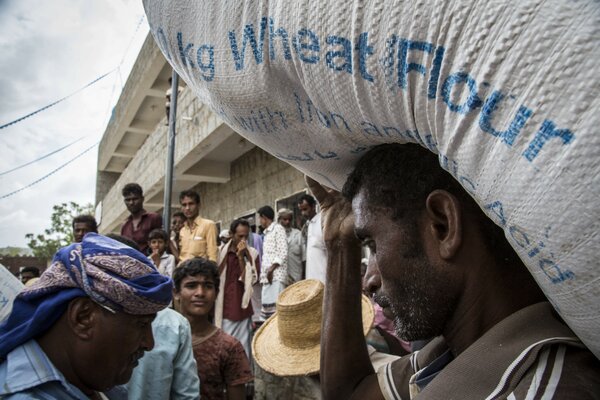
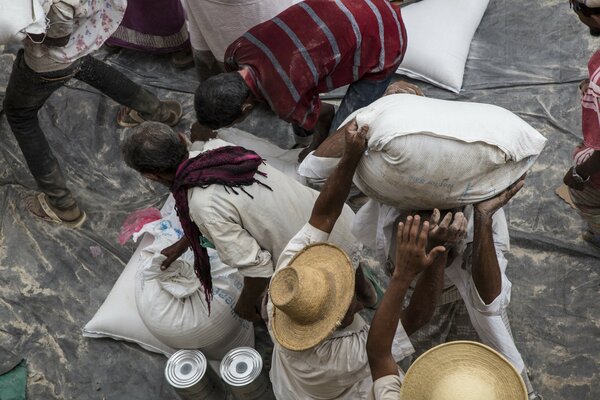
Judy explains that she also monitors the food distribution sites, requiring her to be physically present — and engaged. She holds focus groups with women. "It ensures that the people who get assistance are the right ones," she states factually.
"Do you ever get to hear people's stories about what they've been through?" I ask as I sense a smile that only grows wider. "Every chance I get," she says right before her voice drops.
In 2017, WFP and partners distributed 3.8 million metric tons of food to a combination of refugees, returnees, the internally displaced and residents.
I'm offered a dizzying picture of what it's like to be at a food distribution site. "It's loud, and everyone wants to talk to you," Judy says. "Sometimes there are people crying. When I ask how long the flour will last, I might hear from a mother that she has ten children, a sister who lost her husband, and relatives to take care of." She pauses. "They tell me that the food won't even last them two weeks." A food ration is supposed to last the entire month.
So many people who have lost so much. I wonder where Judy's strength to smile comes from.

A few months after that 2015 surge in violence — when the security situation had stabilized, and aid workers were finally allowed to return to Yemen — Judy arrived in Sana'a where she lives and works in a compound.
"Day quickly turns to night here," she says going back to the demands of the scale-up.
We make some small talk. Less than a quarter of her colleagues are women. She tells me about her background in social work, and how she's an activist for children's rights in Uganda. We chat about her family, the upcoming holidays. We talk like old friends catching-up.
My mind loops back. Three and a half years is a long time to work in a conflict zone. Curiosity gets the best of me, so I ask her to share some of her experiences. She prefaces her answer with another soft chuckle. "Each one of us who has been around, you know, those of us long-timers, we each have stories," she says but this time with a laugh.
"The sound of buzzing means there will be bombshells," she explains stoically. "When there are airstrikes, everything is just shaking." Her tone changes and suddenly her voice becomes more excited. "I've had moments where I ducked under the bed or ran to the bathroom!" There's a certain element of disbelief in Judy as she tells me this; it's almost as if these episodes are silly in hindsight.
I pry some more, hoping I haven't crossed a line and hit a nerve I shouldn't have.
"One time when I was on a field mission, there were airstrikes 250 metres away from where I was staying. That's when I thought it was over — that I was going to die. I texted my family throughout the night that I wasn't coming home alive."
"Sorry, where was this?" I'm worried that I'll interrupt her flow but my fear proves unfounded. "It was Hodeidah, 2017. I thought I was going to die there and that they would be taking a body out, back to Kampala."
I don't know what to say. There's silence. Even the static seems to have gone.
"When I am back home and I hear a plane overhead, my mind rushes. I have to remind myself that I'm in Kampala and not in Yemen," she says. Her smile deafens me.
Judith "Judy" Lumu has over 15 years of experience in humanitarian and community development work. She has worked with WFP for 13 years. Her assignments have taken her to Yemen, Jordan, Central Asia, South Sudan, Afghanistan and her home country of Uganda.
In addition to general food assistance, Judy is also focused on gender mainstreaming and emergency preparedness.
[Updated: 11/01/19]

